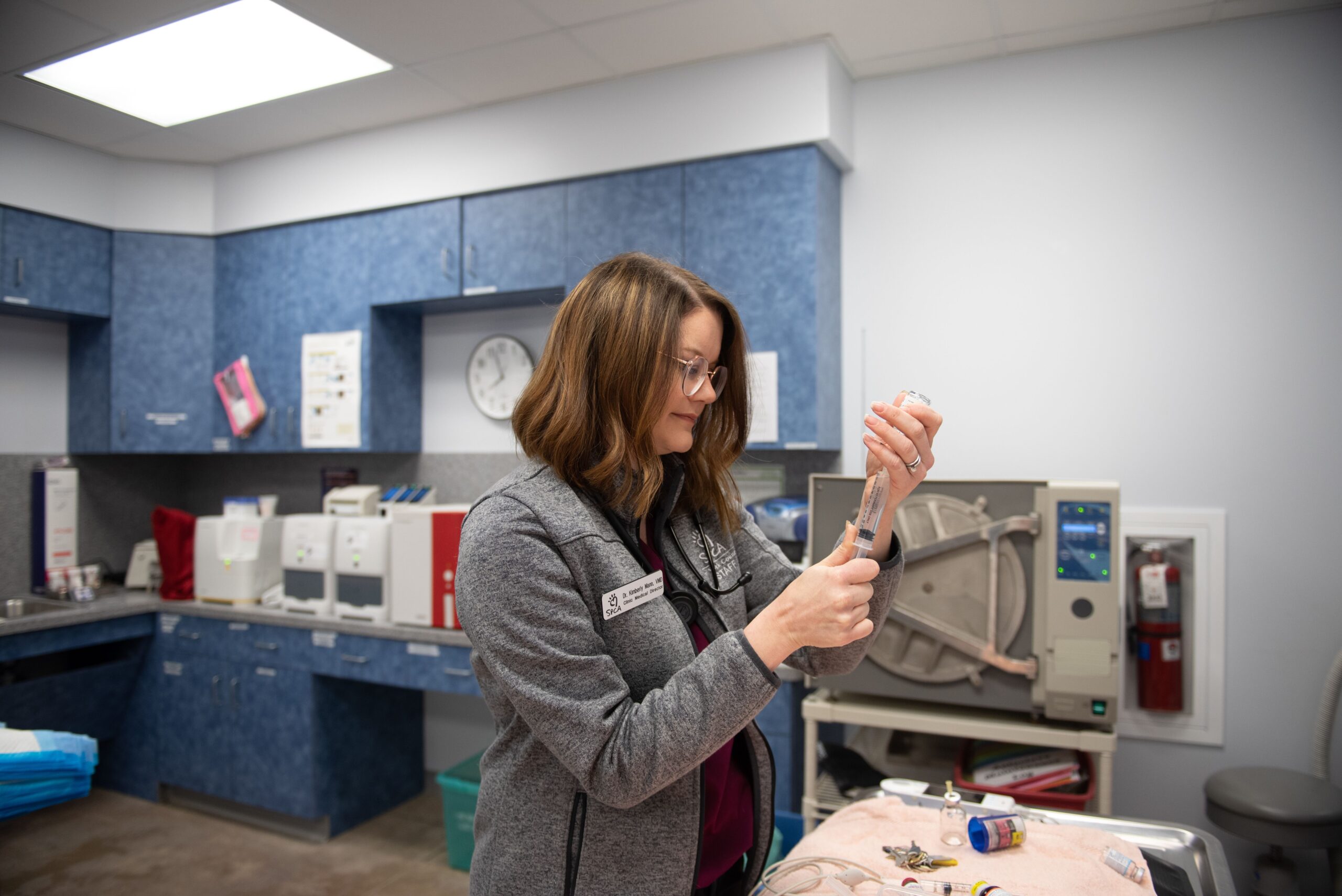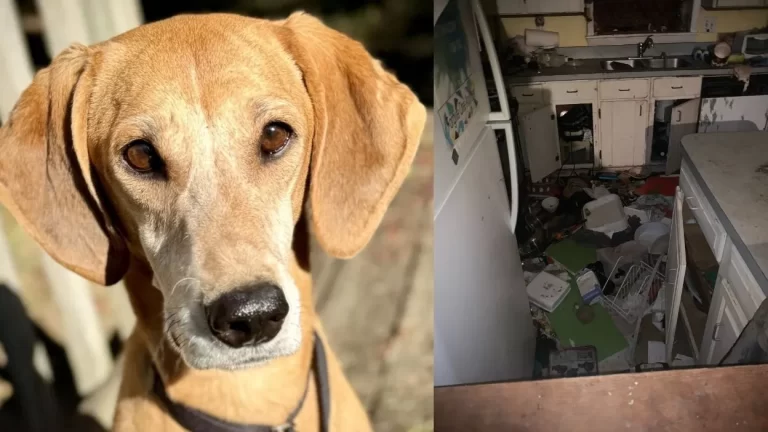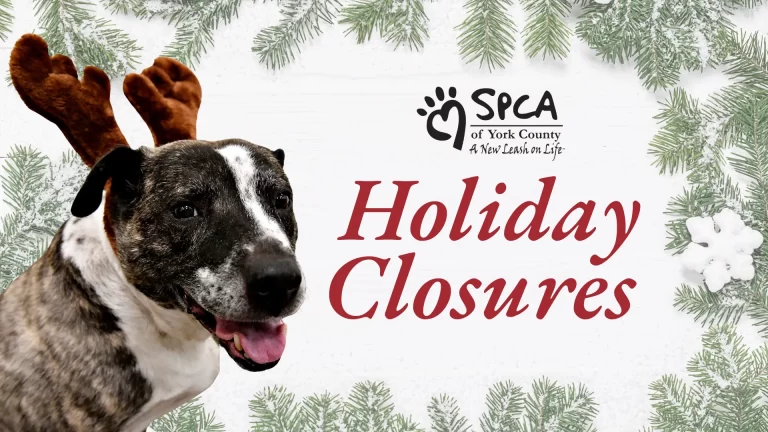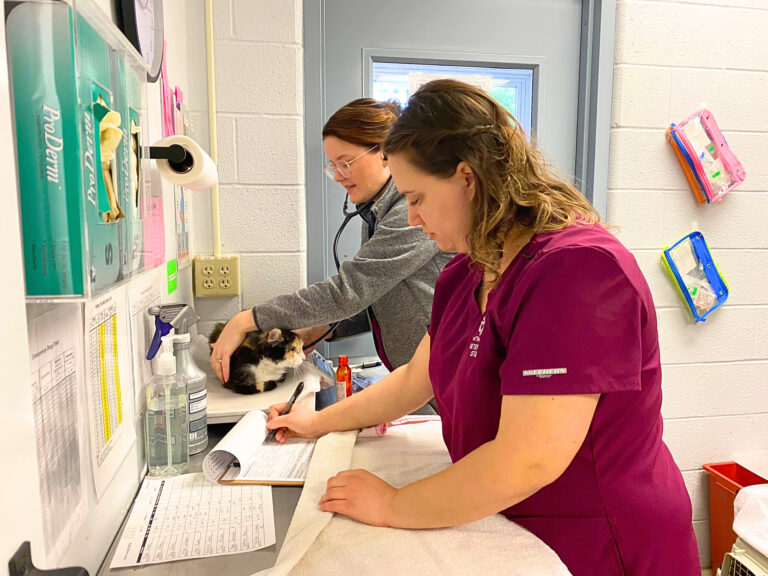August is National Immunization Awareness Month, an important reminder for pet owners to make sure their furry friends’ vaccines are up to date! Awareness of and updating a pet’s immunization status is one of the many ways to exercise responsible pet ownership. Just like humans, pet vaccinations are part of preventative healthcare, providing benefits to pets and the greater population of animals in our community.
These benefits include preventing disease, reducing the risk of illness, and prolonging their life. Vaccines are cost-effective since preventing disease through administering a vaccine is more affordable than treating the illness the disease would cause. Vaccinating pets helps ensure public health and safety by preventing the spread of disease among animals and reducing the risk of zoonotic diseases, meaning they can be spread to humans like rabies (National Immunization Awareness Month | Riverside Animal Hospital, 2023).
Many pets frequently visit high-risk environments where transmission is easier, such as boarding kennels, dog parks, and grooming salons (August Is National Pet Immunization Awareness Month | City of Mission Viejo, n.d.). In these environments, pets are in close contact with one another, and surfaces may be contaminated. Keeping your pets up to date on their immunizations reduces the risk of them getting sick or infecting others.
In July, our own shelter faced a difficult situation because of unvaccinated dogs in the community. In the span of one week, three dogs admitted to our shelter became symptomatic and tested positive for canine parvovirusor “parvo,” a highly contagious disease affecting dogs. Canine parvovirus causes gastrointestinal symptoms like vomiting and diarrhea. In severe cases, it can even lead to death which mainly occurs when dogs are unvaccinated or have a weakened immune system. Thankfully, most of the dogs in our care had been fully vaccinated and were at low risk for contracting the disease. When a dog enters our shelter as a stray, our staff administers four vaccines:
- DHPP, also called DA2PP – this protects against distemper, adenovirus, parvovirus, and parainfluenza
- CIV – this protects against canine influenza
- Bordetella/parainfluenza intranasal vaccine – we give this as an intranasal (into the nose) vaccine because it starts working faster and gives them better local immunity to these contagious respiratory diseases
- Rabies vaccine
Shelter Medical Director, Dr. Natalie Weekes, says, “The DHPP and CIV vaccine must be boostered. Typically, in a home environment with a pet, you would booster a vaccine 3-4 weeks after the initial vaccine. However, due to the high risk of exposure in a shelter environment, the Association of Shelter Veterinarians (ASV) recommends booster vaccines at two weeks in animal shelters. So, that is what we do. Then, they are considered ‘fully vaccinated’ two weeks after their booster vaccine.”
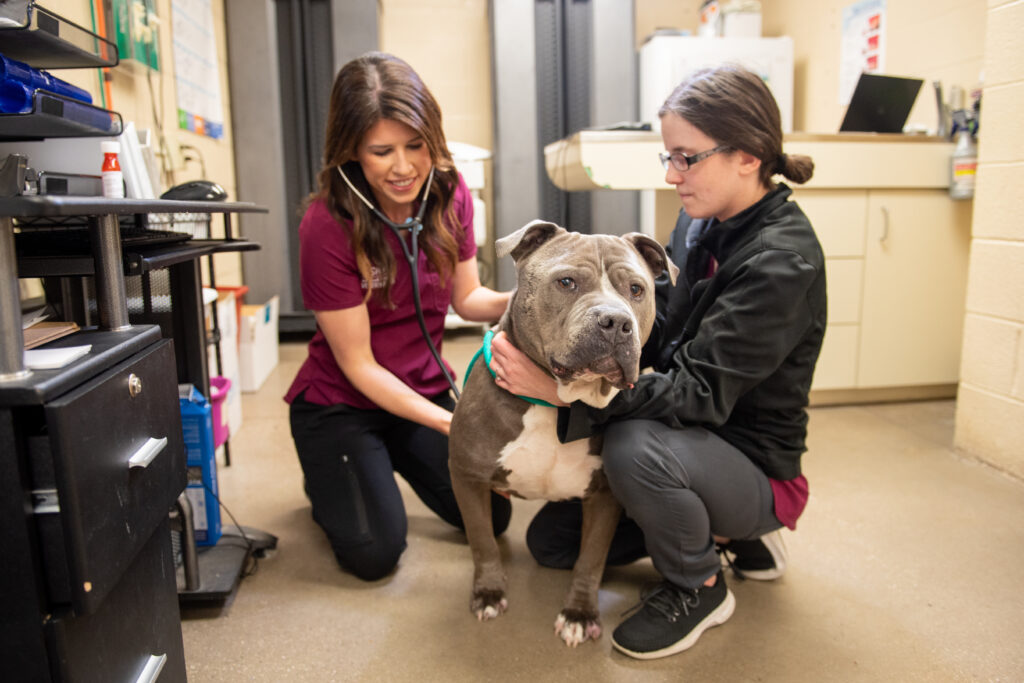
Dr. Natalie Weekes, Shelter Medical Director, examining Hank with Veterinary Technician, Stacey.
In the case of the parvovirus outbreak, some of our dogs had not yet received their booster vaccination because they were not due yet or had just recently received the booster. So, they were at a higher risk of contracting the virus if they came into contact with a positive dog or contaminated surfaces.
Many may not realize that when a virus enters an animal shelter, such as this occurrence, we must activate prevention measures quickly to manage the spread to the rest of our canine population, as well as staff and volunteers’ dogs in their homes. We separated the positive dogs in an isolated area and closely monitored all dogs for 14 days (the incubation time for this specific virus). This could have been prevented if all dogs in our community were vaccinated to prevent them from fatal diseases like parvovirus. However, cost is often a barrier, so access to low-cost vaccination clinics is important.
Dr. Weekes stresses how important it is for the public to keep their pet’s vaccinations current. Some diseases that immunizations protect against, such as parvovirus, can live in the environment for months to years. “This means if an infected dog walks down your street, and you walk your dog down the same street a couple of days later, they will be exposed to that disease and have a high chance of contracting it,” says Dr. Weekes. “Some diseases these vaccines protect against, such as rabies, distemper, and parvovirus, can be fatal if contracted.”
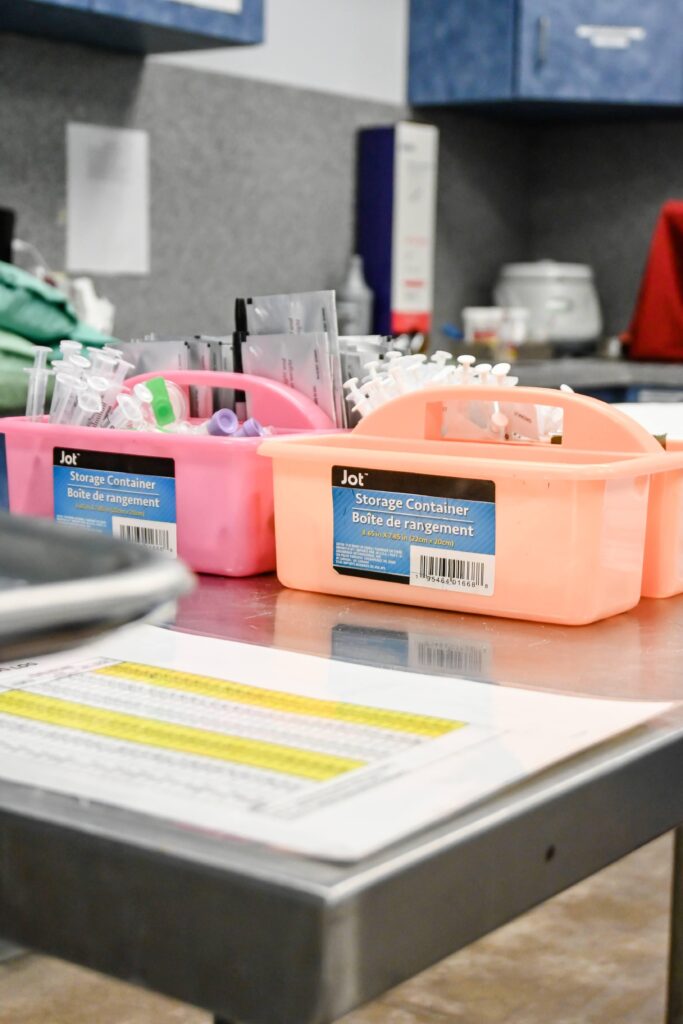
Our Spay/Neuter Clinic staff preparing vaccinations for the animals coming in to be spayed/neutered and vaccinated.
Dr. Weekes also encourages pet owners in the community to discuss the core and non-core vaccines that are recommended for their pets based on the owner’s lifestyle and the pet’s exposure risks. Core vaccines are essential vaccinations for protecting the health of a dog (Core vs Non-Core Pet Vaccinations, 2024). Non-core vaccines are vaccinations that are decided depending on the individual dog’s exposure risks (Canine Core and Non-Core Vaccines Explained, n.d.). She reminds owners that “young animals are the most susceptible to diseases due to their weakened and still developing immune system, so it is important to ensure they are fully vaccinated before taking them around other animals.”
The best way to observe National Immunization Awareness Month would be to make sure that your furry friends have received all the immunizations they need to continue to live happy and healthy lives. If you are unsure of your pet’s immunization status or know they are behind, schedule an appointment with your veterinarian to update your pet’s vaccinations. If you’re seeking low-cost vaccination clinics for your pets, research online to see if local shelters, pet stores, or veterinary centers are holding events offering affordable vaccinations. Many hold events like this throughout the year. We also recommend researching your local Tractor Supply store, as many locations have PetVet Wellness Centers which offer low-cost, basic veterinary care – including vaccinations, microchipping, nail trims, deworming, and more. Click here to find the location closest to your residence.
References:
August is National Pet Immunization Awareness Month | City of Mission Viejo. (n.d.). www.cityofmissionviejo.org. Retrieved July 24, 2024, from https://www.cityofmissionviejo.org/departments/animal-services/august-national-pet-immunization-awareness-month#:~:text=August%20is%20National%20Immunization%20Awareness%20Month
Canine Core and Non-Core Vaccines Explained. (n.d.). www.gardensanimalhospital.com. Retrieved July 29, 2024, from
https://www.gardensanimalhospital.com/post/canine-core-and-non-core-vaccines-explained
Core Vs Non-Core Pet Vaccinations. (2024, January 11). www.transitanimal.com.https://transitanimal.com/core-vs-non-core-pet-vaccinations
National Immunization Awareness Month | Riverside Animal Hospital. (2023, August 3). Riversideanimalgb.com. https://riversideanimalgb.com/news/national-immunization-awareness-month-23
Photography Credit:
Tetra Creative Studio https://tetracreative.studio/

